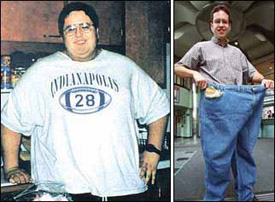ALL:
CR is close to worthless.
Care to enlighten us?
I'll admit the dreams of adding 30-40 years to maximum lifespan were most likely premature, but the health benefits in general should easily add more than a decade to mean lifespan (just based on the overwhelmingly improved health markers; obviously we don't have mortality figures to substantiate this yet), and I wouldn't call that worthless.
I think that is very unlikely. As outlined in teh posts referenced in this
post by opales, the complete ELIMINATION of ischemic heart disease, stroke and cancer would gain an average 50-y-o about 15 years. Unless CR actually retards aging in humans, then Aubrey is likely right that it will gain only a very few years over and above a basically healthy diet & lifestyle (as is the stipulated condition of this discussion).
Now moderate CR with a good exercise plan will probably buy you most of the benefits, so I'll admit that extreme CR is probably not worth it unless you're in it for the lifestyle. Extreme CR may only add a few years more than what you can get from moderate CR and exercise, while negatively affecting QoL (hardcore CRers might debate this point, but then again, they're hardcore CRers...).
... and therefore in the best condition to know

. IAC, if we can indeed extrapolate from the animal evidence on this, then the data are very clear: up to the point of actual starvation,
the life extension effect of CR is a linear inverse function of Caloric intake. Fewer Calories = more years of healthy, youthful lifespan, down to the point of frank starvation. There are no diminishing returns.
Jay, what's wrong with Aubrey's argument [1]?
Quite a lot, in my view -- some of it theoretical, and very much empirical. See my finally-epublished reply (2), whose full text I will send out en masse to any inquirers in a couple of days.
I've since come across additional documentation favoring the idea that the Okinawan centenarians were only CRed significantly for part of their lifespans; one that I can readily dig up & summarize is the finding that today's Okie centenarians have a similar (higher for men, lower for women) Caloric intake to that of other Japanese centenarians (3). This may actually mean that they eat MORE per unit mass than other Japanese cents (not that I'm convinced that this "relative Caloric intake" is actually important), as they have relatively stunted bodies from Caloric undernutrition & protein malnutrition in their childhoods.
As well, the publication of the study showing a 15 yr more "youthful" diastolic function in long-term human CR practitioners (5) was published long after final acceptance of my MS, and provides support for the idea that CR has a direct effect of CR on primary aging in humans.
Demetrius' Metabolic Stability Hypothesis also predicts that in humans "the response of life span to caloric restriction will be negligible". So it would seem that my position has solid backing.
I wouldn't describe as 'solid backing' a conclusion drawn from a vaguely-defined hypothesis about the nature of aging and the mechanisms of aging and CR itself ...
As far as I'm aware there was only one randomized human study that measured the effect of CR, rather than the already known toxicity of the control diet, and while the effect was certainly beneficial I would not exactly call it "overwhelming".
The study you cite (CALERIE I) was actually a good example of a study of the already known toxicity of the control diet/lifestyle

. The subjects were all quite overweight to obese, and (surprise!) normalizing energy intake, leading to weight loss (or temporarily putting them on a Draconian diet until their weight normalizes), imporved their reisk factors. This kind of thing is a dime a dozen; there are already plenty of such studies published -- they just don't talk up their grant proposals or results in terms of CR and aging.
There have been previous trials that more accurately reflect the effects of CR per se, tho' they're small and unambitious and I'm too lazy to dig the cites up just now unless someone is really interested. OTOH, while not truly controlled, Fontana's data on long-term hard-core CR folk (4) are pretty darned convincing; arguing against a cohort effect is the baseline conditions of the CR group and the clear-cut, dramatic improvements in these on CR (see
Table 3. Arguing against the effect of a merely healthy lifestyle are the comparisons with raw-food vegans and runners, and the fact that the diets vary pretty widely in their macronutrient compositions and inclusions/exclusions.
Likewise, although not formally statistically analyzed as yet, it's pretty damned clear that the data collected to date by the
CR Society Cohort Study is quite consistent with a powerful effect of CR per se, independent of a range of specific diet structures (Zoneish, healthy-Atkinsesque, Pritkinite).
Anecdotally, almost any CR person with whom one talks will tell you about the shock of their physicians when they see their lab tests after one to six months' CR.
Again, however, the possible effect CR on primary aging in humans (5), based on the observed more youthful diastolic function, is certainly much more excciting than the risk factor results, and much more important as an indicator that CR will indeed work in humans as it does in rodents, dogs, etc.
-Michael
1: de Grey AD.
The unfortunate influence of the weather on the rate of aging: why human caloric restriction or its emulation may only extend life expectancy by 2-3 years.Gerontology. 2005 Mar-Apr;51(2):73-82. Review.
PMID: 15711074 [PubMed - indexed for MEDLINE]
2. Rae MJ.
You don't need a weatherman: famines, evolution, and intervention into aging.
AGE. 2006 May 23;[Epub ahead of print]
No PMID assigned yet.
3. Suzuki M, Hirose N, Arai Y, Ebihara Y, Takayama M. Nutritonal status and its effects in Japanese centenarians. In Tauchi H, Sato T, Watanabe
T (eds). Japanese Centenarians: Medical Research for the Final Stages of Human Aging. 1999; Institute for Medical Science of Aging, Aichi, Japan:
116-23.
4. Fontana L, Meyer TE, Klein S, Holloszy JO. Long-term calorie restriction is highly effective in reducing the risk for atherosclerosis in humans.
Proc Natl Acad Sci U S A. 2004 Apr 27;101(17):6659-63. Epub 2004 Apr 19.PMID: 15096581 [PubMed - indexed for MEDLINE]
5. Meyer TE, Kovacs SJ, Ehsani AA, Klein S, Holloszy JO, Fontana L. Long-term caloric restriction ameliorates the decline in diastolic function in humans. J Am Coll Cardiol. 2006 Jan 17;47(2):398-402. PMID: 16412867 [PubMed - indexed for MEDLINE]
Edited by Michael, 09 February 2009 - 09:51 PM.
Where is the post? (and how old is the guy?)



























































